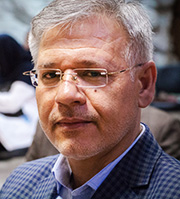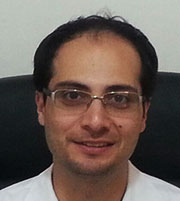-
Details
-
Written by Ali Asghar Darzi, Alieh Nikmanesh, Farhad Bagherian
-
Parent Category: Year 2016, Volume 8
-
Category: Volume 8, Issue 5, May 2016
-
Hits: 4785
Background: Laparoscopic cholecystectomy (LC) is one of the most common surgeries in laparoscopic surgery. Although, it is believed that LC has low-risk for post-operative infectious complications, the use of a prophylactic antibiotic is still controversial in elective LC.
Objective: To determine the impact of prophylactic antibiotics on postoperative infection complications in elective laparoscopic cholecystectomy.
Methods: In this double-blind, placebo-controlled, randomized, clinical trial, patients who were candidates for elective LC, from March 2012 to 2015, in four hospitals in Babol, Iran, were studied. Patients were allocated randomly to two groups, i.e., group C: Cefazolin (n = 182) and group P: placebo (n = 247). Group C received 1 g of Cefazolin 30 minutes before anesthesia and and then, six and 12 hours after anesthesia. Group P patients received 10 ml of isotonic sodium chloride solution. Age, gender, type of gallbladder diseases (stone, polyp, or hydrops), the length of post-operative hospitalization, frequency of gallbladder rupture, the duration of surgery, and the kinds of complications associated with infections were collected for each patient in the two groups. The data were analyzed by IBM-SPSS version 20, using the t-test and the chi-squared test, and a p-value < 0.05 was considered as significant.
Results: There were no significant differences between the two groups in terms of gender (C versus P: 18 (9.9%) male versus 22 (9%); p = 0.74), age (C versus P: 43.75 + 13.30 years versus 40.91 + 13.05; p = 0.20), and duration of surgery (C versus P: 34.97 ± 8.25 min versus 34.11 ± 8.39; p = 0.71). There were no significant differences between the two groups in the incidences of post-operative infection (C versus P: 3 (1.7%) versus 5 (2%); p = 0.99) and rupture of the gallbladder (C versus P: 14 (7.8%) versus 17 (6.8%); p = 0.85). No other post-operative systemic infectious complications (e.g., sepsis, pneumonia, or urinary tract infection) were found in either group.
Conclusion: For patients who underwent laparoscopic cholecystectomy (LC), prophylactic antibiotics had no important role in the prevention of infections; so these antibiotics apparently are not necessary in treatment, and they are not recommended for patients with laparoscopic cholecystectomy as low-risk selective antibiotics.
Trial registration: The trial was registered at the Iranian Clinical Trial Registry (http://www.irct.ir) with the IRCT identification number IRCT2013070413865N1.
Funding: This research was supported financially by the Research Council of Babol University of Medical Sciences.
Keywords: Antibiotic prophylaxis, Surgical wound infection, Laparoscopic cholecystectomy
HombreAsics Onitsuka Tiger
The most recent editorial (June 2021)
Ethics of Publishing Case Reports: Do We Need Ethics Approval and Patient Consent?
An editorial by Dr. Mehrdad Jalalian
Read more.

The worldwide spread of COVID-19 as an emerging, rapidly evolving situation, and the dramatic need of urgent medicine or vaccine, has rapidly brought new hypotheses for pathophysiology and potential medicinal agents to the fore. It is crucial that the research community provide a way to publish this research in a timely manner.
To contribute to this important public health discussion, the Electronic Physician Journal is excited to announce a fast-track procedure to help researchers publish their articles on COVID-19 related subjects that fall under the broad definition of public health, internal medicine, and pharmacology. We are especially welcome to all hypotheses about the pathological basis of the COVID-19 infection and the possible characteristics of potential medicine and vaccine. Submit your manuscript here
Our previous editorial (June 2020)
Lessons from COVID-19 pandemic and the Morocco’s success story.
An editorial by Dr. Benksim Abdelhafid (Morocco)
Read more.

The 6th World Conference on Research Integrity (WCRI) is to be held on June 2-5, 2019 in Hong Kong.
The WCRI is the largest and most significant international conference on research integrity. Since the first conference in Lisbon in 2007, it has given researchers, teachers, funding agencies, government officials, journal editors, senior administrators, and research students opportunities to share experiences and to discuss and promote integrity in research. Read more:

TDR Clinical Research and Development Fellowships
Call for applications
Deadline for submission: 7 March 2019, 16:00 (GMT)
TDR provides fellowships for early- to mid-career researchers and clinical trial staff (e.g. clinicians, pharmacists, medical statisticians, data managers, other health researchers) in low- and middle-income countries (LMICs) to learn how to conduct clinical trials. Read more:

Meta-Analysis Workshops in New York, USA, and London, UK, in April and May 2019
Don't miss this exceptional opportunity to learn how to perform and report a Meta-analysis correctly. Two Meta-analysis workshops are organized in April and May 2019 by Dr. Michael Borenstein in New York, USA (April 08-10, 2019) and London, UK (May 27-29).

About the Instructor
Dr. Michael Borenstein, one of the authors of Introduction to Meta-Analysis, is widely recognized for his ability to make statistical concepts accessible to researchers as well as to statisticians. He has lectured widely on meta-analysis, including at the NIH, CDC, and FDA. Read more:

























